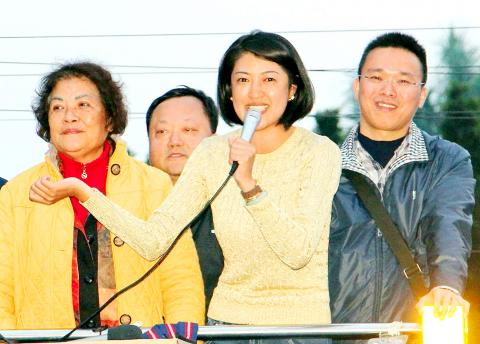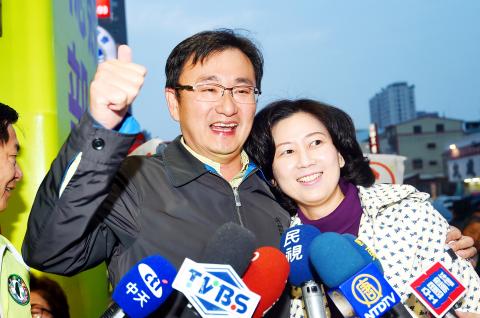The Democratic Progressive Party (DPP) held on to its three seats while the Chinese Nationalist Party (KMT) kept its two in yesterday’s legislative by-elections in five electoral districts — Taichung, as well as Changhua, Nantou, Miaoli and Pingtung counties.
The vacancies were created after five legislators, three from the DPP and two from the KMT, were elected as city mayors or county commissioners in the nine-in-one elections on Nov. 29 last year, in which the KMT suffered an unprecedented defeat and secured just six seats out of 22, a drop from 15.
The by-elections caused no changes to the current legislature’s composition.

Photo: Hsieh Chieh-yu, Taipei Times
In Pingtung, DPP candidate Chuang Ruei-hsiung (莊瑞雄), with 42,988 votes, won in a landslide against the KMT’s Liao Wan-ju (廖婉汝), who received 20,627 votes. The southern county’s election had the largest vote difference among the five regions contested.
The closest race was in Nantou, where KMT candidate Hsu Shu-hua (許淑華) won with 38,694 votes, edging past the DPP’s Tang Huo-sheng (湯火聖), who secured 34,938 votes.
The DPP’s legislative candidates for Taichung — Huang Kuo-shu (黃國書) — and Changhua — Chen Su-yueh (陳素月) — also won their electorates, after leading their main KMT competitors, former vice premier Hsiao Chia-chi (蕭家淇) and former Changhua County commissioner Cho Po-yuan (卓伯源) respectively, by more than 10,000 votes.

Photo: Liao Yau-tung, Taipei Times
Huang received 45,143 votes to Hsiao’s 32,917, while Chen garnered 51,907 votes — 17,200 more than Cho’s 34,707.
In Miaoli, DPP Legislator-at-large Wu Yi-chen (吳宜臻), who had withdrawn from the contest to yield the opportunity to student activist Chen Wei-ting (陳為廷) before Chen dropped out due to a groping scandal, lost the election to the KMT’s Hsu Chih-rong (徐志榮), who topped Wu’s 32,966 votes with 47,105.
The newly elected legislators are to serve short terms, as the election for the ninth legislature is scheduled for early next year.
Whether that election is to be synchronized with next year’s presidential election, usually held in March, is still being debated.
The DPP last night thanked voters for their support in the by-elections, vowing to work harder in Miaoli and Nantou counties.
“These [results] show that voters still hold high expectations for further reforms, so the candidates must therefore remember the responsibilities that voters have placed upon them and stay loyal to the people,” DPP Secretary-General Joseph Wu (吳釗燮) told a news conference.
DPP Campaign Strategy Committee convener Su Jia-chyuan (蘇嘉全) attributed the KMT’s victories in Miaoli and Nantou counties to the KMT’s strong local organizations.
Su said that the DPP’s securing of the other three seats gives the party more confidence for the future, as it demonstrated that voters trust the party.
KMT spokesperson Lin Yi-hua (林奕華) offered congratulations to the two KMT candidates who were elected yesterday, and extended her regards to the other three candidates who lost.
She said the KMT thanks the voters for their support as the party recovers from its greatest defeat ever in November last year and promises to continue its efforts with the utmost sincerity and innovation.

SECURITY: As China is ‘reshaping’ Hong Kong’s population, Taiwan must raise the eligibility threshold for applications from Hong Kongers, Chiu Chui-cheng said When Hong Kong and Macau citizens apply for residency in Taiwan, it would be under a new category that includes a “national security observation period,” Mainland Affairs Council (MAC) Minister Chiu Chui-cheng (邱垂正) said yesterday. President William Lai (賴清德) on March 13 announced 17 strategies to counter China’s aggression toward Taiwan, including incorporating national security considerations into the review process for residency applications from Hong Kong and Macau citizens. The situation in Hong Kong is constantly changing, Chiu said to media yesterday on the sidelines of the Taipei Technology Run hosted by the Taipei Neihu Technology Park Development Association. With

CARROT AND STICK: While unrelenting in its military threats, China attracted nearly 40,000 Taiwanese to over 400 business events last year Nearly 40,000 Taiwanese last year joined industry events in China, such as conferences and trade fairs, supported by the Chinese government, a study showed yesterday, as Beijing ramps up a charm offensive toward Taipei alongside military pressure. China has long taken a carrot-and-stick approach to Taiwan, threatening it with the prospect of military action while reaching out to those it believes are amenable to Beijing’s point of view. Taiwanese security officials are wary of what they see as Beijing’s influence campaigns to sway public opinion after Taipei and Beijing gradually resumed travel links halted by the COVID-19 pandemic, but the scale of

A US Marine Corps regiment equipped with Naval Strike Missiles (NSM) is set to participate in the upcoming Balikatan 25 exercise in the Luzon Strait, marking the system’s first-ever deployment in the Philippines. US and Philippine officials have separately confirmed that the Navy Marine Expeditionary Ship Interdiction System (NMESIS) — the mobile launch platform for the Naval Strike Missile — would take part in the joint exercise. The missiles are being deployed to “a strategic first island chain chokepoint” in the waters between Taiwan proper and the Philippines, US-based Naval News reported. “The Luzon Strait and Bashi Channel represent a critical access

Pope Francis is be laid to rest on Saturday after lying in state for three days in St Peter’s Basilica, where the faithful are expected to flock to pay their respects to history’s first Latin American pontiff. The cardinals met yesterday in the Vatican’s synod hall to chart the next steps before a conclave begins to choose Francis’ successor, as condolences poured in from around the world. According to current norms, the conclave must begin between May 5 and 10. The cardinals set the funeral for Saturday at 10am in St Peter’s Square, to be celebrated by the dean of the College